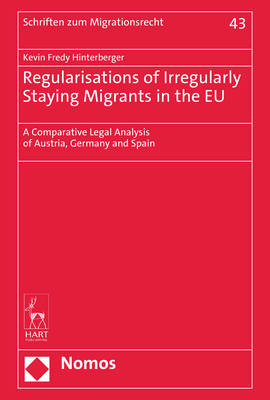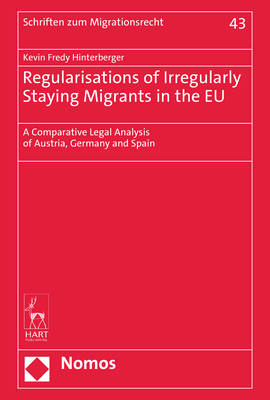
- Afhalen na 1 uur in een winkel met voorraad
- Gratis thuislevering in België vanaf € 30
- Ruim aanbod met 7 miljoen producten
- Afhalen na 1 uur in een winkel met voorraad
- Gratis thuislevering in België vanaf € 30
- Ruim aanbod met 7 miljoen producten
Zoeken
Regularisations of Irregularly Staying Migrants in the EU
A Comparative Legal Analysis of Austria, Germany and Spain
Kevin Fredy Hinterberger
€ 100,45
+ 200 punten
Omschrijving
'Combatting' irregular migration is one of the key challenges to migration management at EU level. The present book addresses one of the most pressing structural problems regarding the EU's return policy: the low return rate of irregularly staying migrants. In this regard the EU Return Directive obliges Member States to issue a return decision, yet only 40% of such decisions are enforced annually. Moreover, despite the political and legal efforts, the EU is not making any significant progress in enforcing the rules it has laid down in the Return Directive. The legislation of EU Member States may, however, serve as a source for possible solutions to 'combat' the problem of irregularly staying migrants. It is for this reason that the book compares the system of regularisations in Austria, Germany and Spain. Regularisations constitute an effective alternative to returns because they terminate the irregular residence of migrants, not through deportation, but rather by granting a right of residence. Regularisation is therefore understood as each legal decision that awards legal residency to irregularly staying migrants. As is shown by the examination and comparison of regularisations in Austria, Germany and Spain, differentiated systems of regularisation exist at national level. However, EU regularisations supplementing the present return policy would be more effective at 'combatting' irregular migration at EU level.
Specificaties
Betrokkenen
- Auteur(s):
- Uitgeverij:
Inhoud
- Aantal bladzijden:
- 398
- Taal:
- Engels
- Reeks:
- Reeksnummer:
- nr. 43
Eigenschappen
- Productcode (EAN):
- 9783848772704
- Uitvoering:
- Hardcover
- Afmetingen:
- 153 mm x 227 mm
- Gewicht:
- 657 g

Alleen bij Standaard Boekhandel
+ 200 punten op je klantenkaart van Standaard Boekhandel
Beoordelingen
We publiceren alleen reviews die voldoen aan de voorwaarden voor reviews. Bekijk onze voorwaarden voor reviews.







